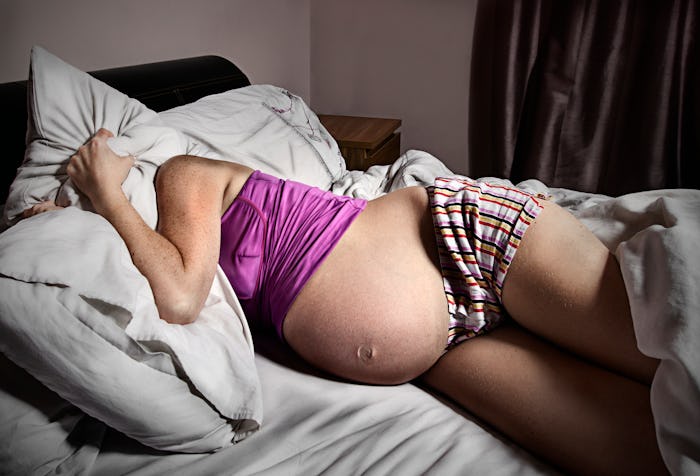Labor

Waking Up Sweaty In The Middle Of The Night Doesn’t Always Mean Labor’s Coming
It’s just another way to feel uncomfortable during pregnancy.
It’s dark outside, and you wake up in your bed soaking wet. You’re pregnant, but your water hasn’t broken. You’re just sweating. If night sweats mean you’re in labor, then it’s go time. But maybe it isn’t.
When you’re pregnant and close to your due date, you question if every new physical experience is a sign that you’re in labor. Who doesn’t? And suddenly waking up drenched is definitely a moment you’d question.
Well, let’s get some answers.
During pregnancy, you have a higher body temperature and sweating is a way for the body to regulate it. If you and your spouse haven’t gone at it over the thermostat, or you haven’t had a moment of trying to fan yourself and cool off while they have on sweats and a blanket, just give it some time...
But sudden sweats at night don’t always equate to a pivotal moment.
“Night sweats, hot flashes, and different things like that can happen during pregnancy because it's a progesterone-related state. Progesterone is the hormone of pregnancy. So when progesterone levels are high and estrogen levels are low, you can have hot flashes or night sweats during the course of pregnancy. It doesn't necessarily correlate with labor,” says Dr. Vonne Jones M.D., and OB-GYN.
There are three phases of labor: early, active, and transitional. During each phase, your body is preparing to give birth, but before it can do that, it has to shift to its next phase. Being warm and sweaty is a symptom of transitional labor — the final phase — according to What to Expect. But if you’re in labor, sweating is usually compounded with several other symptoms like lower back pressure, nausea, leg cramps, and fatigue. But remember that every birth experience is different, so if you feel like your body is transitioning (even though you may not have other accompanying symptoms), it’s OK to call your doctor or midwife to check in.
“Sometimes, towards the end of pregnancy, you can have leakage of fluid from urine because the bladder sits right in front of the uterus,” Jones says. But Jones also notes that you can tell a difference between your water breaking and leaking urine by seeing if a gush of fluid down your leg saturates a pad when you put one on. “That would be another indication for reaching out to your provider.” But this still isn’t a sure indication that labor has begun, only that your water is broken, and you can have your doctor evaluate what is actually happening.
So there’s no need to go rushing for your hospital bag because you’re a bit sweaty. If you are in labor, you will have additional signs. “Ideally, labor would be more correlated with actual, consistent contractions that are coming despite drinking water and resting,” Jones says.
If there are no other symptoms — like your water breaking or persistent contractions — you can give it some time. Take some deep breaths and change into some dry clothes.
Expert:
Vonne Jones M.D. OB-GYN